Shouldering
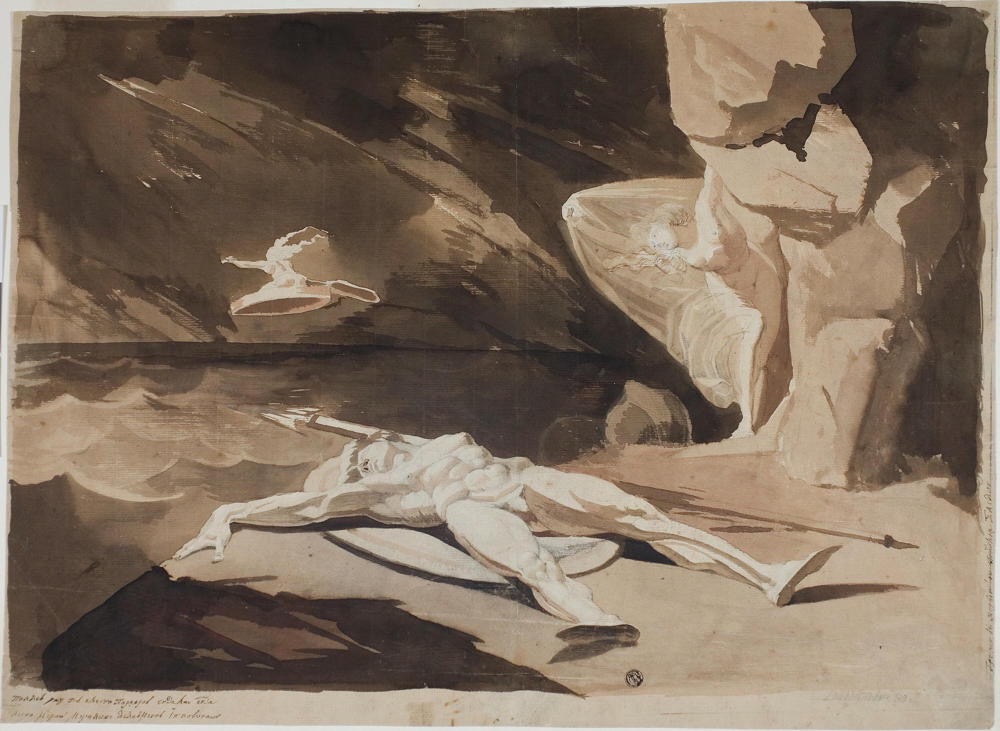
Henry Fuseli: Thetis Mourning the Body of Achilles (1780)
"Not one of us ever was whole or normal …"
We each possess some weakness, though it often seems like it possesses us. Either way, it comes to dominate some days, crowding out intendeds for its senseless imperative. In my time, I've suffered through various afflictions, not one of them worth mentioning in their absence. The details couldn't matter. I presently feel my right shoulder more than anyone should ever feel their right shoulder's presence. This weakness goes back to last Spring when I was over-enthusiastically prepping the back deck for painting. After a couple of days of vigorous sanding I was feeling done in. I diagnosed the condition as deltoid bursitis, but it could have been anything, for a stubbed toe by any other name, to paraphrase Shakespeare, would feel the same. I hired our painter to finish that job while setting out to cure that latest affliction. I was better two months later.
I am confident I do not know what I might have done to encourage this condition to occur.
Indicting

Walter Crane: Miss Goody Two Shoes, accused of witchcraft. (1874–76)
" … these episodes make me stronger and more resilient."
I would have made one Hell of a Puritan. Always watchful, I'm rarely able to slip anything by myself. I catch myself out and then indict without anything resembling a preponderance of evidence. The merest hint of an infraction, and I'm crawling up my own ass, complaining. I then set about worrying myself back into rough compliance, if that’s even possible. It isn’t always possible. I perform a form of penance, usually accepting the accusation without much questioning before joining in with the punishing portion of the performance. Quickly incarcerated with an immutable sentence, I set about serving my time. Having fallen short, I understand that I will never stand tall. Reform's beyond question. The best that could happen might be that, over time, I find that I've forgotten so that I no longer carry the full weight of my well-deserved burden.
I was painting, an occupation in which I usually exhibit competence.
Chinooking
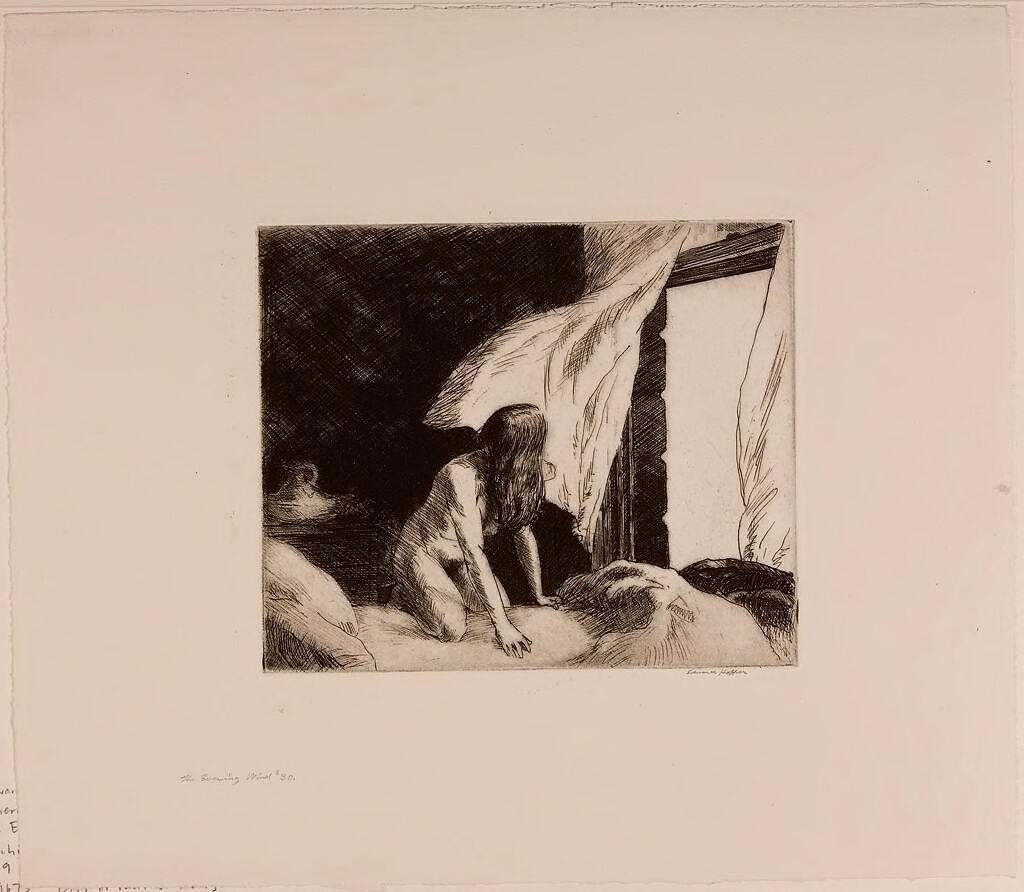
Edward Hopper: The Evening Wind (1921)
"Just that breath of Spring reset the calendar."
In early January, I told myself that Winter was here for good. After a week or two of chilling temperatures and slick roads, I'm more than ready to hibernate until Spring. Everything freezes, even beliefs. Impossibilities come to dominate, and hope wisely recedes into some obscure corner. I go on autopilot and nap more than seems healthy. Then, I take an initiative. Just a small one, a chore I've been avoiding since we first bought this place. A typical obligation for which the proper time to dispatch it conveniently never arrived. A home properly contains a few dozen of these embarrassments. They understandably rarely, if ever, get addressed, so it seems newsworthy if one finally gets dispatched.
Just starting helps.
Phantoms

Mario Bettini: Imaginem in cylindrica superficie rectè formatam in plano horizontali ritè de formare.
[To form an image on a cylindrical surface correctly formed in a horizontal plane.]
(1645 - 1655)
"I continue hunting and pecking …"
I realize that I hold, at best, a severely superficial understanding of anything. I learned enough to convincingly fake it for a time, only to discover later that my knowledge would not prove sufficient. It appears there's always a deeper understanding lurking somewhere. This principle holds doubly true for procedures, which seem to exist in layers. The definable portion might get written down, though rarely very coherently. The rest exists as tacit understanding, or perhaps it is better described as contingent understanding, details that could never hold much meaning until after considerable superficial practice. Until I'm in over my head, depth holds little significance. Then, it suddenly becomes the most important dimension, just when I discover that I have little prior knowledge or understanding of coping with its presence.
The editor replied that I'd added "sections" to the manuscript, which had caused the paragraphs to strangely break, seemingly at random.
NonProphet
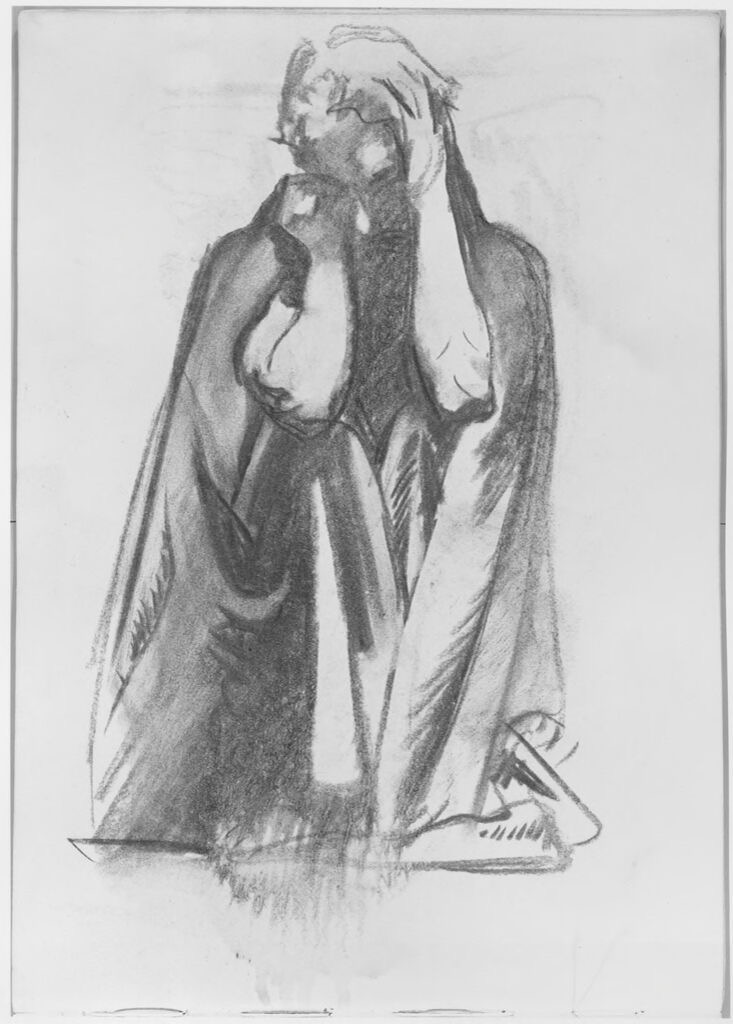
John Singer Sargent: Study for the Prophet Obadiah,
Boston Public Library (1892-1894)
"I'm no prophet …"
Now that The Muse serves as an elected Port Commissioner, she finds herself under increasing demand. She's already been invited to join several non-profits as a board member or advisor, her electoral success perhaps perceived as a transferable skill. She remains wary since she's not yet fully aware of all her Commissioner role might demand of her, but she accepts the invitations if only to learn what's going on here. She's seen as one of the powerful now. Like anywhere, this valley benefits from many non-profits focusing on helping the less fortunate. They try to provide safety nets but often fail to fully satisfy the needs. The poor will, indeed, always be with us. These organizations employ armies of dedicated people and many volunteers, paying back and paying forward what their success afforded them.
The Muse sometimes insists that I tag along.
Weekly Writing Summary For The Week Ending 1/25/2024

Beatrix Potter: Mice with Candles (1903)
The New Finished
After only five and a half years of intermittent effort, I finally submitted one of my series for publication this week. The finish mirrored the process. I noticed as I skimmed through a compilation of the manuscript that I had not adequately indexed the text, so I went back through one final time to assign styles to everything: Body, Buried Lede, Caption, Verse, and Heading; this to ensure a consistent finished product and to ease making later changes. Just that morning, I discovered I’d inadvertently mislabeled my current series iOlogue instead of iAlogue. I’d felt stupid for making the mistake. Still, I felt redeemed when I immediately disciplined myself to go back and correct every instance of the error, which had proliferated in the over thirty days since I’d innocently committed it. I had to change records in my Blog master, manuscript master, Facebook intros, SubStack copies, and LinkedIn posts. This effort consumed more than two hours. With this experience fresh in my mind, I warily submitted that manuscript, aware that maintaining it would get even more complicated before publishing was finished. That manuscript’s final compilation revealed some inconsistencies in the compiling process. I submitted the damned thing anyway, noting to the editor that paragraph breaks seemed inconsistent from the source document. I figured that complication might be resolvable later. Not even that finished product was truly finished.
We labor in the misguided conviction that we might one day finish something when getting something started might be the very best we can ever hope to accomplish. Our work remains a work in process even long after we hoped it might be finished. Can’t Be Undone might be the new done.
CrowdControl

Arthur Rothstein: Crowds at races,
Indianapolis, Indiana (1938)
" … messier but more fully human …"
My internal dialogue rarely speaks in a single voice. It's more often an ensemble and often an unruly one. It can speak in contradictions or coherence, but it almost always features considerable noise in the channel, as if some connection was faulty. It can sometimes border on cacophony, deafening, dizzying, and more confusing than informing. It provides mixed messages that might encourage any action or any response. That level-headed reactions most often result sometimes seems like a miracle. I hear voices, some convincing recreations of voices now long past and others more similar to my own murmurings. I whisper to myself sometimes so that I can distinguish between emphatic direction and mere distraction. I seem like a ship steered by an unruly committee.
My work has always been rooted in my ability to control that crowd.
Matter

Stuart Davis, After Mark Rothko,
After William Baziotes:
Sketches of “Max,” Mark Rothko’s “No. 19,”
and William Baziotes’ “Moonstruck” (1950)
"The fuzzy distinction between … won't become interesting until much later."
In Late January, Matter exists in one of two states: Sleeping or Not Sleeping. Not Sleeping Matter out-numbers Sleeping Matter several times, so much so that Sleeping Matter will sometimes seem a mythical state. Not Sleeping Matter often rests and might be easily mistaken for the Sleeping kind, but it differs in several ways. Sleeping Matter lacks self-consciousness, nor can it produce thumping noises like footsteps trundling down a hallway toward a bathroom. Sleeping Matter might snore, though it will deny that it holds that ability. Not Sleeping Matter tends toward grumpiness.
It's no wonder why Matter tends to bifurcate in Late January.
Belligerence

Jack Gould: Untitled [tug-of-war] (1955)
"Bruising sometimes occurs …"
Not every story wants to be told. Some seem adamant about remaining private. A few seem to employ extraordinary means to prevent their author from sharing them. On the other hand, a writer must sometimes insist, regardless of how vehemently a story might resist being tamed. The Belligerence, when opposing, sometimes seems overwhelming. While The Muse snoozes, I might be engaging in hostilities few should believe could happen. My office and desktop have seen countless wee-hour battles between my insistence and those stories' stubbornness, and I have not always won. Plenty of budding stories have lost their chance of becoming shared by merely holding their breath until they turned blue or just digging in their heels. Some of the best ones refused to be chronicled by me or anybody, and that's the honest truth.
As a lifelong pacifist, I cut a curious figure when I headed into battle with this Belligerence.
ApoplecticAngels

Odilon Redon:
The Lost Angel Then Opened Black Wings, from Night (1886)
" … he noticed a shadow falling over his finished product …"
An Apoplectic Angel oversees my daily production. An even more apoplectic one supervises publication. Neither can quite comprehend what I'm doing. My work follows no standard development pattern: no plot, no protagonist other than the forbidden observer and The Muse, and no apparent purpose. The implied purpose does not seem well supported by the result. Readying my Cluelessness manuscript, posted initially as my CluelessSummer series in the summer of 2018, has taken five-and-a-half years to reach pre-publication, and even then, those ApoplecticAngels second guess my intentions. They compare what I've produced with what some other writer might have created and seem to have weighted their judgments in favor of the other fella. I hesitate, perhaps fatally, at the prospect of publishing this book.
I want to reread it, hoping that a sixth time through provides the experience the first five times didn't yield.
ShopTalking

Adriaen van Ostade: Man and Woman Talking (17th century)
"It's a sincere form of caring to keep nodding rather than merely nodding off."
As The Muse assimilates into her new career as a Port Commissioner, her ArmCandy gets to learn previously unimaginable dialects. He had grown accustomed to her speaking in alien tongues when she signed on to work with the Biofuels program in The Department of Energy in DC fifteen years before. Learning the various terms and acronyms she began tossing around from day one was a bit of a chore. He knew his job was to help talk her down from whatever ledge her new job responsibilities had left her hanging from, even on those too-frequent three-gimlet evenings. He would listen as if he understood and grew to think himself awfully good at pretending to understand. He would occasionally toss in an innocent question and ask for a translation into generally accepted English, but usually just accepted as gibberish what seemed to hold such deep significance for her. Spouses have done no less throughout history.
Every profession carries its unique dialect.
Discerning
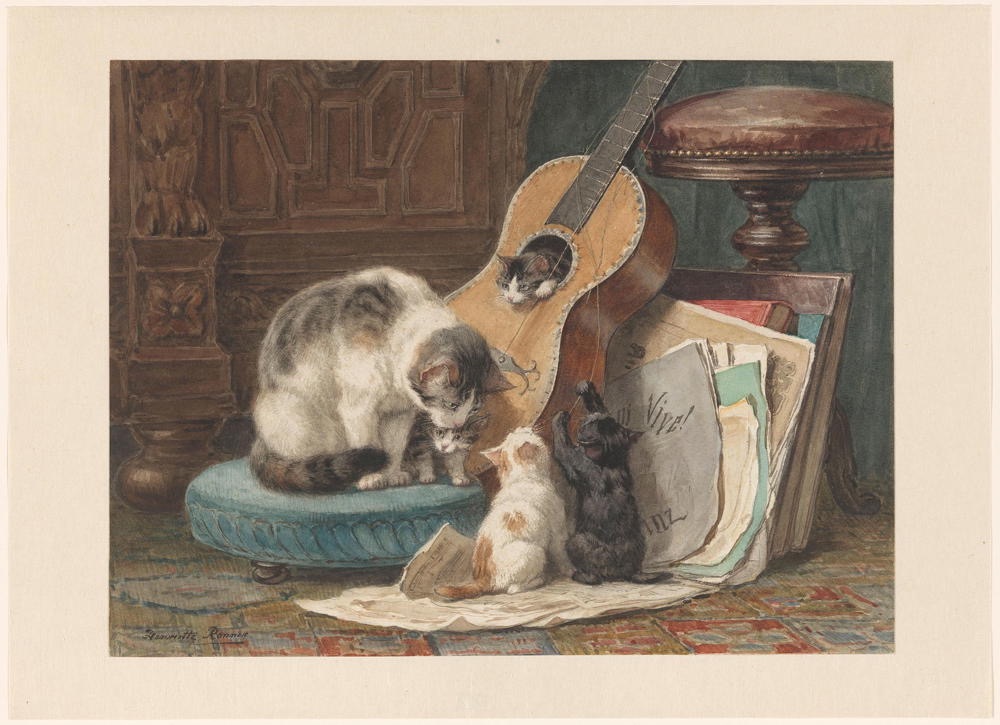
Henriëtte Ronner: The Musicians (c. 1876 - 77)
" … betters tend to sum to worses …"
I think of myself as a Discerning person, my internal dialogue constantly comparing this to that and that to something else, seeking, if not best, better. I have little use for best and no reasonable way to determine its presence except by direct comparison. As a Discerning person, I am continually comparing, though, considering how well I'm doing. I often feel dissatisfied without being able to imagine alternative means to improve my experience. The simple act of dissatisfaction rarely carried its antidote along. Usually, it is quite the opposite, as dissatisfaction prevents me from perceiving any alternative.
I had long been dissatisfied with how I created my Weekly Writing Summaries.
Writing Summary For The Week Ending 01/18/2024

Jan Ekels (II): A Writer Trimming his Pen (1784)
Some Hand Greater Than The Writer’s
This expectation I hold that I will always possess something worth disclosing usually serves me well. Writers come to understand the redeeming power of expectation, how the otherwise trivial act of expecting often results in producing something worth disclosing. No cause-or-effect relationship actually exists, though. Something else creates the result. I sometimes believe it’s the cornering effect at work. Reduce options to one, and often, that one remaining option will seem ideally suited to whatever couldn’t have even been intended. We speak of synchronicity but more often rely upon even greater mystery than synchronicity delivers. I could have sworn when posting this writing week’s stories that I had fallen short with every one. It was not until, as usual, I slowed down to reflect upon what I’d produced that I caught the edge I hadn’t noticed I’d created. Some hands more skilled than the writers always work the keys. Thank you for following along with me here.
NightWatch

Rembrandt van Rijn: The Night Watch (1642)
“ … failing to make much sense of my mission again.”
Weather dominates my news through Winter's first quarter. Every day brings another aspect into focus as a series of fronts promising change move into and over the area. One morning, snow's expected. The following: record low temperatures. I anticipate each shift as if being invaded. My sleep, normally ragged and discontinuous, turns almost non-existent as I lie there, wondering if the next assault has started yet. I cannot seem to successfully ignore it or just let it happen. It seems to want a witness, and I seem to need to witness as if it couldn't occur without me there or as if some catastrophe might ensue if I were absent. I have been slouching in a reading chair most recent nights, peering out the big front window, waiting for the latest show to start, neither sleeping nor especially alert, on NightWatch.
My internal dialogue seems muted then.
Interpreting
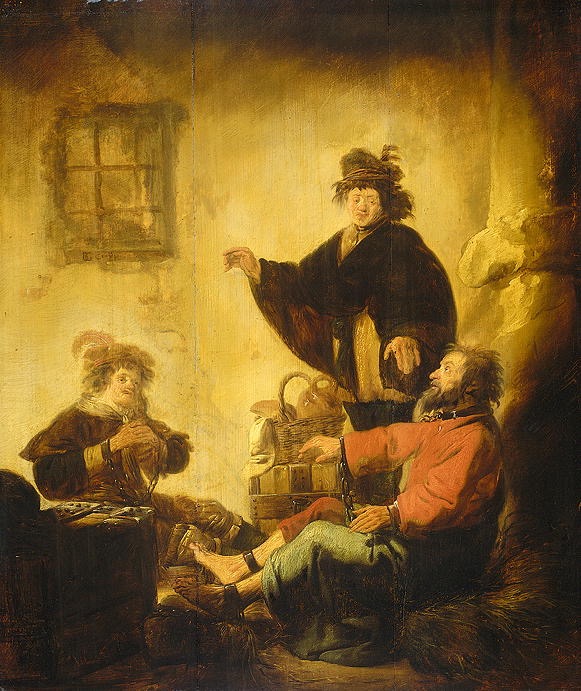
Benjamin Gerritsz. Cuyp:
Joseph interpreting the dreams of the baker and the butler (1630)
" … just like everybody else."
My daughter Heidi, gone nearly three years now, worked as a teacher and interpreter, performing simultaneous translations for patients and plaintiffs unfamiliar with English. Her career focused precisely on what we all engage in, if less explicitly, for we are always Interpreting whatever we witness. No experience comes pre-interpreted for our convenience, and it's probably for the worst that we grow complacent over time, even losing the sense that we are Interpreting when it's all we ever do. Heidi complained of fierce headaches after a day of intentionally Interpreting. I sometimes register the same complaint. I often feel as though I never learned how to interpret and that I generally make a hash out of my attempts.
I am a particularly inept mind reader.
Mumming

Eugène Romain Thirion: Study of the Head of the Angel
for “Joan of Arc Listening to Voices” (c. 1876)
"I have no story today because I have not a thing to say to anybody …"
My internal dialogue never was continuous. Though it usually seems uninterrupted, breaks do occasionally appear. I do not always notice, and since I'm the only one serving as witness, if I don't notice, it's as if it never happened or just as good as never happening. I do sometimes notice, though. I notice these empty slots without commentary, for any comment would nullify the Mumming effect. Mumming appears like a slip of paper placed between pages in a set, a spacer. If it serves any more profound purpose, I have never been party to it. It signifies nothing and needs no meaning attached to justify its presence. I think of and about it only in its absence, for when it's present, I let it lie or leave it lay. My internal dialogue has nothing whatsoever to say while I'm Mumming.
With all the attention presencing attracts these days, I can sometimes seem altogether too present, too aware, too much in a moment.
Unspeakables

Henri Martin: Silence (1894/97)
"Only I hold the power to counter that power … "
Silence surely stands as the most powerful of all the superpowers granted to mortals, though it's pure potential, so few suspect its presence. The Unspoken commands great authority in human affairs, and the Unspeakable unquestionably holds the greatest. A mouthful of Unspeakable feels like gravel. It's genuinely embarrassing. It seems illicit and dirty. It too easily convinces the one possessing it to remain silent, even perhaps unto death. The bulk of its great power comes from just this sense: if it's mentioned, great calamity might ensue. Someone might get offended. Relationships might have to be ended, friendships ruined, associations severed. A great and terrible truth might render asunder even the tenderest alliance.
The secret might consume its holder, rendering them not merely mute.
gNattering

Percy J. Billinghurst: The lion and the gnat. (1900)
"The human condition demands much worrying and little changing."
I consider myself to be a world-class worrier. I anticipate well and catastrophically. I natter better than almost everybody. I dread exceptionally well. This continual background noise in my cognitive channel might serve as my screen saver, exercising my internal dialogue without producing any overwhelming excess of anything, for gNattering produces nothing and might even disperse otherwise troubling accumulations. Nobody remembers whatever they might have been gNattering on about, for the exercise might have always been to prevent retaining. Had I been contemplating instead, I might have needed to store something for later reference, further filling my head. gNattering effectively prevented that inventory, leaving me more ready to acquire something substantial later, or not.
I understand that I only utilize some tiny portion of my brain's potential.
DJ
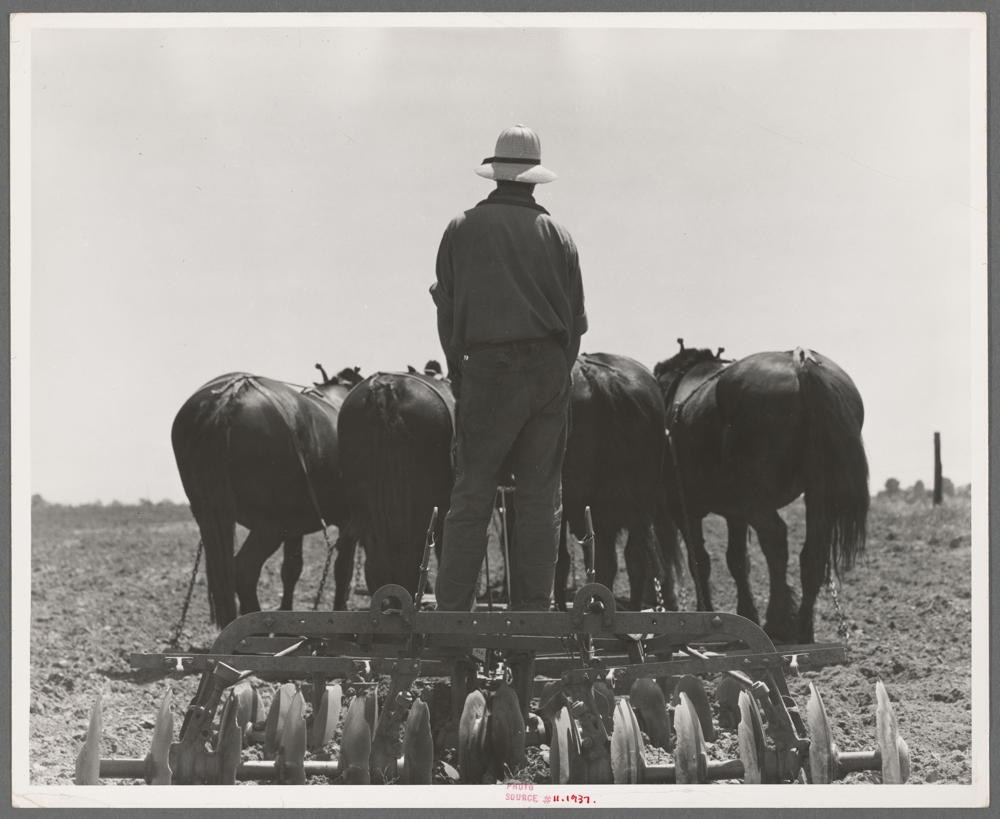
Dorothea Lange: Disc used in corn fields in California.
It is drawn by seven horses. Tulare County, California (1938)
" … seems to be looking out for me."
My internal dialogue occurs on several seemingly concurrent channels, like SiriusXM Satellite Radio, which features dozens of channels, each carrying a specific type of program. I frequently listen to their Broadway channel, for instance, where I can usually access some big production numbers that lift my spirits, and their Sinatra channel, which plays The American Songbook. I mention this because my internal dialogue is not exclusively comprised of verbal interaction but also sometimes includes music, often with lyrics and sometimes without. Like with my Ruminating that I described in a recent story, my internal dialogue serves up more than conversation.
The musical channels fascinate me.
Writing Summary For The Week Ending 01/11/2024

Yoon Kwang-cho: Heart Sutra (2007)
About To Happen
What would you do if your dream came true? I engineered most of my life to cope with not achieving a dream-come-true state. An encroaching dream coming true feels genuinely threatening to my well-practiced status quos. I know precisely how to cope with disappointment but feel totally unprepared to accept success, however modest. I procrastinate, hastening extremely slowly into its grasp as if it were a trap. I wonder what its embrace might bring. I puzzle over the changes it might insist upon my sacred routines, however shopworn they seem. I sense the potential that I'll have to write a different story, one I only secretly ever intended to author. Stay tuned. Something interesting's about to happen here.
Ruminating

Jacob van Ruisdael:
Landscape with Figure Resting Under Tree by Stream
(not dated)
" … I can start Ruminating onto a page instead …"
Most mornings, I spend some time Ruminating before I begin writing. Ruminating seems distinct from merely thinking, for it occurs almost wordlessly. My usual narrator idles, and I seem to sort through my thoughts without classifying or, Heaven forbid, analyzing motive or meaning. It almost seems like dreaming. The theme for that day's writing usually manifests during these sessions while I sort out my emerging feelings and opinions. Old wounds might revisit to display themselves, as well as old successes. Anything's allowed. The rest of the house continues sleeping while I engage in this grand resorting.
I finish refreshed and often inspired.
MorePerfect

Photograph of Lincoln Memorial Youth March for Integrated Schools.
Photograph/National Archives Catalog.
Department of the Interior. National Park Service.
National Capital Parks. (10/9/1933 - 1/22/1962).
" … toward MorePerfect but not perfection …"
I admire Abraham Lincoln's facility with English. He could really turn a phrase. His most memorable moment came in his first inaugural where he spoke of our responsibility to create "a MorePerfect union." He cleverly avoided proposing perfection as a target yet deeply implied that it might lurk somewhere out there where we might move in its general direction. He managed to remain realistic while projecting an idealistic glow over the proceedings, producing one memorably masterful phrase.
MorePerfect probably describes much of my iOlogue.
TrashTalkingToMyself
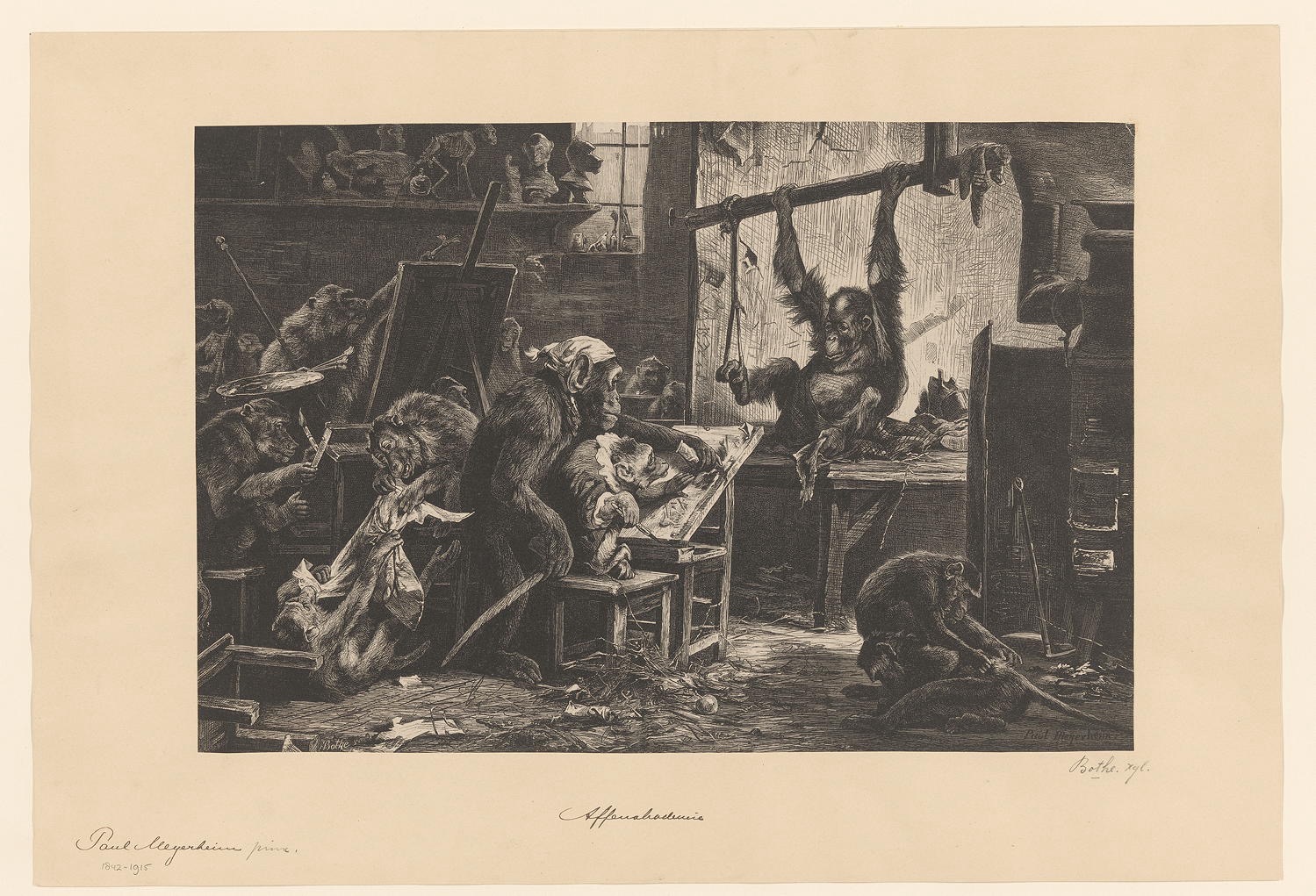
Bothe, after Paul Friedrich Meyerheim:
Apen in een atelier [Apes in the studio] (1852 - 1915)
" … a great and enduring blessing in my life …"
My chattering mind never completely shuts down. It natters away night, day, and every moment in between. It has essentially nothing to say. It never did and probably never will, yet it still serves a beneficial and essential function in my psychological ecosystem. It might be my linguistic gyroscope, that part of my iOlogue, my internal dialogue, that keeps me sane. However, anyone besides me, privy to the conversation, might reasonably conclude the opposite. The content makes no objective sense, exemplifying nonsense. It sounds, even to me, as if I'm shoving shit at myself, for it's comprised of critique and passing commentary, seemingly just so much chattering, monkeys manning my belfry.
When The Muse and I arrived in exile in Washington, DC, I noticed two distinct cultures as I walked the streets.
BothSides

Joe E. Brown:
You Said a Mouthful, [Front cover, Pamplet] 1944
Talk out of both sides of your mouth: idiom
[US disapproving (also speak out of both sides of your mouth)]
To say something that is the opposite of what you have said before or to express different opinions about something in different situations in a way that may deceive people.
—Cambridge Dictionary
" … speak out of every side of every mouth …"
I never aspired to be recognized as the pinnacle of consistency. I try to appear reasonably coherent, but I'm apt to contradict myself anytime. I was not born with a mind that remembers what's come out of my mouth in the past, so I might innocently insist upon the opposite of what I formerly absolutely insisted upon. I explain to myself that the context shifted, but I doubt my more scrupulous listeners buy that excuse, even though it probably represents the whole truth. The truth is, I might appear to be lying. This isn't a strategic choice but almost always an accident, an honest representation of what's happening inside me. I hold some convictions very loosely.
I'm the kind of witness easily badgered on the stand.
TalkingThruMyHat

Amedeo Modigliani: Madam Pompadour (1915)
" … frantic iOlogue might appear."
Talk through your hat: (idiom UK informal)
To talk about something without understanding what you are talking about:
"Nothing of what he said made sense - he was talking through his hat."
—Cambridge Dictionary
More often than I comfortably admit, I speak before I know. Before I know enough about the context. Before I know sufficient to knowingly comment. Before I know whether my target is even listening. I only sometimes embarrass myself after I should have embarrassed myself speaking. This occurred when I spoke too soon or had no charter to say anything. I often just wanted to stay in the conversation, to contribute my share even when—and maybe especially when—I felt I might not have anything intelligent to contribute. It's then when I tend to say something stupid and wear it as if I were wearing some outlandishly inappropriate hat that can't help but dominate my presence. I almost exclusively humiliate myself.
Strictly speaking, TalkingThruMyHat may not belong classified under iOlogue, internal dialogue.
DrDoolittle

Thomas Rowlandson:
Doctor Syntax drawing after nature (1812)
" … that conversation could also be pure projection."
Talking with animals seems rather like talking with God. It's only troublesome when the animals start talking back, though those of us dedicated to this practice often receive responses from our partners. I do not care if these responses come from my projections or if I only imagine a conversation occurring. I receive my intended result. I feel more connected, which might be close to the whole purpose of human existence. A person isn't always available or amenable to civil discourse, while most animals agreeably absorb whatever observation I might care to share with them. Even my friend Caroline's dog Banjo, who, strictly speaking, was never a scrupulous listener, seems to appreciate my comments as he attempts to whip me into submission with his tail. He's exuberant whenever company arrives.
I swear that the primary reason I'm a cat person must be their willingness to listen.
Writing Summary For The Week Ending 01/04/2024

Ben Shahn: Sideshows at the Ashville,
July 4th celebration, Ashville, Ohio (1938)
It's A Genuine Wonder
The winter holiday season provides several prominent mileage markers. I can easily anticipate whatever's coming next for several weeks before entering into January's relative wasteland. I find myself praying for weather, anything to differentiate one cold, foggy day from another. I tucked into a long-procrastinated painting project, one I'd imagined becoming a messy can of worms if started, but my dread was unrequited. As is often the case with procrastination, initiating effort disproved my delaying premise. I should feel grateful for an asperation really worth procrastinating over. Once finished, I will need to drum up another possible can of worms to properly dread or perhaps simply surrender to the January ennui. I might be in the final stages of signing a book contract. I fear that will also become a can of worms, so I have been expending some of my excess procrastination energy on not gaining closure on that effort. It's a genuine wonder I ever accomplish anything.
Play-By-Play
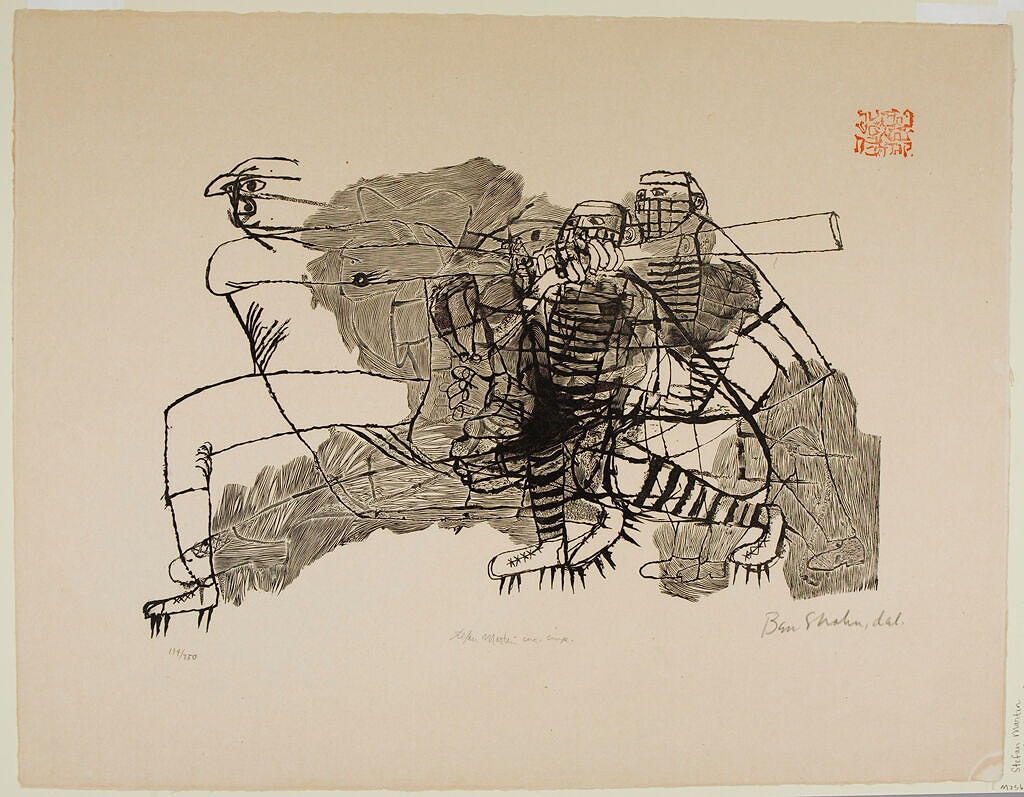
Stefan Martin and Ben Shahn: Baseball (1968)
"I feel reassured then and tuck my head down …"
Besides TalkingMyselfInto, Through, and OutOf, my inner dialogue, my iOlogue, mainly consists of what I might best describe as Play-By-Play commentary. Like a sportscaster, I'm reporting on my performance in real time as the movie unfolds. Sure, I do my share of after-action reporting, but most of my attention focuses on the action happening right before me. Unlike most sportscasters, though, I also perform the role I describe. It's as if a pitcher was wired up and offering color commentary as he throws the game. If this seems as though it must be distracting, it tends to be, as you, dear reader, certainly know, for you probably fill the same role in whatever game you're calling. This must be how we each first attempt to make meaning of our performances. We'll reserve the right to make second, third, and even more guesses, but initial impressions tend to get laid down as the play progresses.
I deeply admire Play-By-Play announcers, the good ones, anyway.
TalkingMyselfOutOf
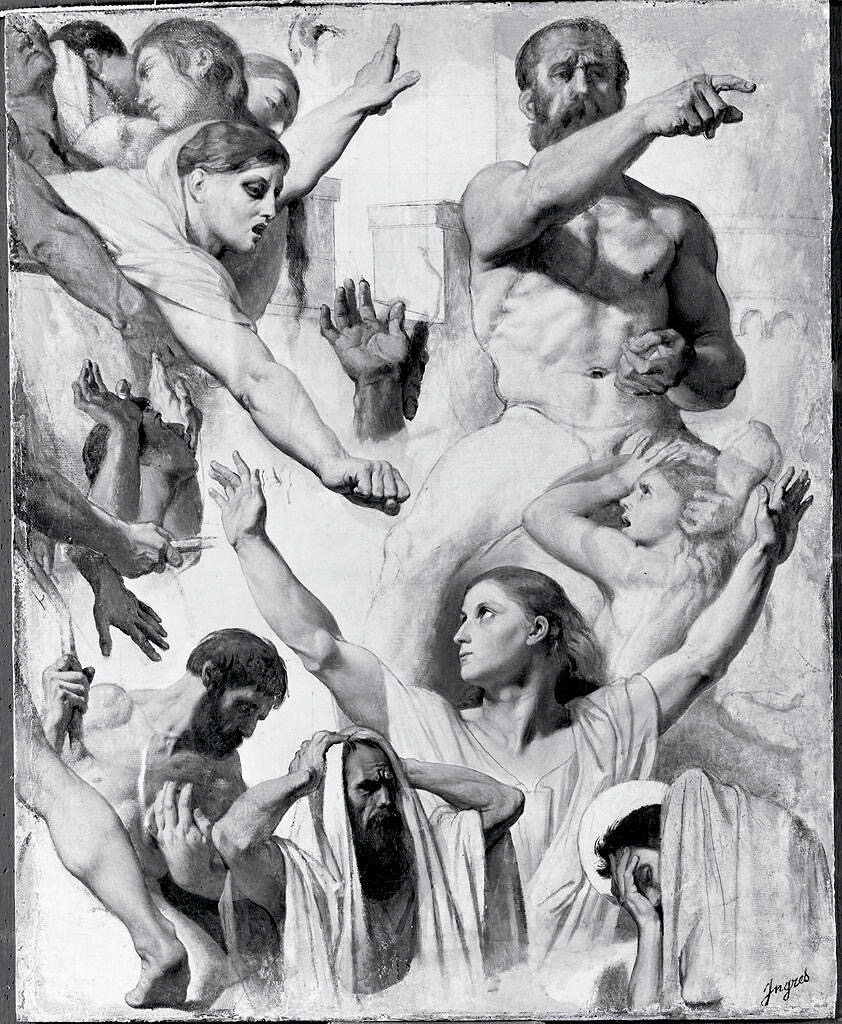
Jean-Auguste-Dominique Ingres:
Studies for "The Martyrdom of Saint Symphorien"
(Saint, Mother, and Proconsul) (1833)
"I fancy that I finish better whatever's left on my plate …"
I should probably be most grateful for all my many unanswered prayers, for as I have continued aging, I have become an absolute idea generator. More bright ideas spring out of my imagination than any dozen Davids could ever follow up on, so I have, by necessity, become perhaps most skilled at TalkingMyselfOutOf. Out of doing. Out of completing. Out of starting in the first place. Most of my great ideas drift to the bottom of the very well they seem to spring from to compost or perhaps regenerate, likely for me to reject or deny them again. I suffer from idea indigestion. I rarely swallow.
I often wonder what my life would have become had I had to struggle for every alluring notion I needed to sustain me.
HappyTalk
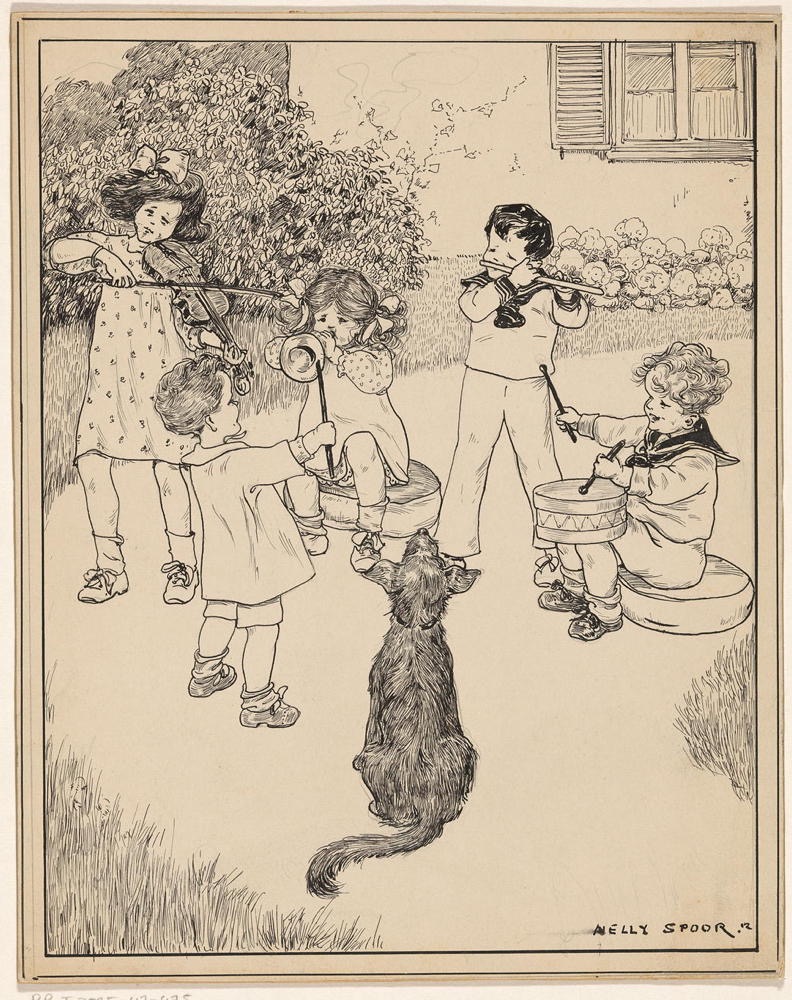
Nelly Spoor: Kinderorkest in een tuin
[Children's orchestra in a garden] (1912)
" … delighted to have even a bit part in this latest ongoing production."
My iOlogue, my internal dialogue, most often amounts to a soundtrack rather than a back-and-forth conversation, a concert more than a dialogue. I serve as a passive observer, witness, and fan. I firmly believe The Great American Songbook contains most of the advice worth taking in this world. If I had my druthers, I'd re-release The Bible as a compendium of Twentieth Century pop, jazz, and show tunes with lyrics more usefully instructive than any other moral/spiritual guidebook ever compiled. The vast majority of the tunes are so-called love songs and many focus on the more practical aspects of the emotion than does the typical heavenly host. Even the occasional vengeful tune employs language in ways that render them extremely attractive and unforgettable.
Rodgers and Hammerstein's HappyTalk, from their hit Broadway show South Pacific, typifies what I'm talking about here.
SilentPilot

Anders Zorn: Pilot (1919)
"Nobody ever was or ever will be an island …"
I claim to carry on an iOlogue, an internal dialogue for the purpose of navigation, but I might misrepresent the actual mechanism. I do carry on an iOlogue once inspiration visits, but inspiration visits silently, like that proverbial thief in the night, like Santa Claus, like nothing at all. However I might seek direction, it seems to take its own sweet time to come, for it owns that seeking time. The harder I strive, the longer I wait, or so it so often seems. The notion I seek doesn't speak to me so much as to tap me on my virtual shoulder to gain my attention. Once my attention focuses, the inspiration's passed and my benefactor returns to his natural state, which seems both silent and invisible. He surfaces relatively rarely even if usually daily, for the instant he appears measures in sub-seconds before he disappears again.
I speak of him as 'him,' but only for convenience.


